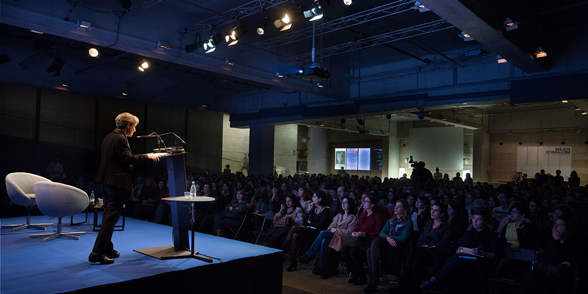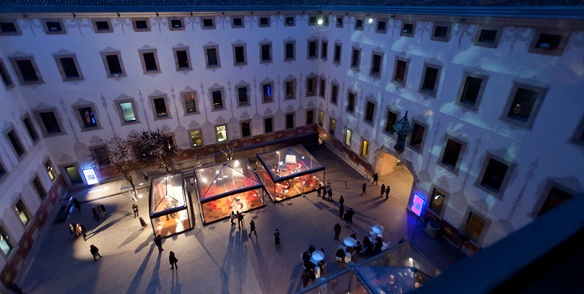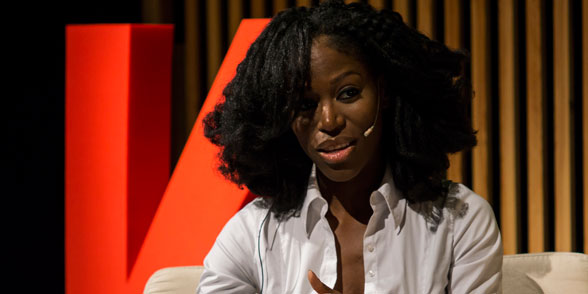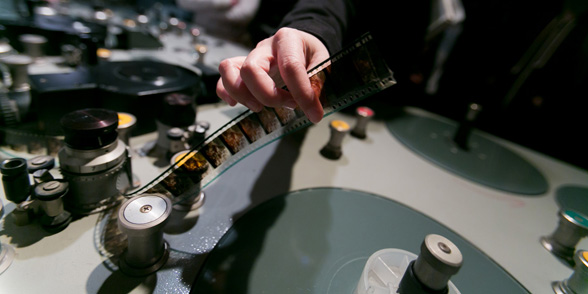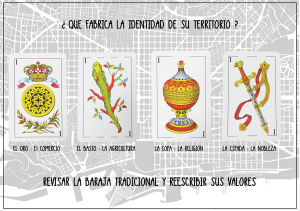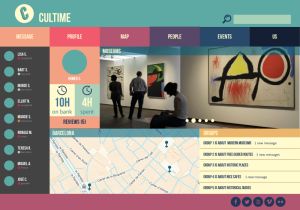A new year is just around the corner and it’s time to give you a taster of what we’re cooking up at the Centre de Cultura Contemporània, what the various programming teams are working on, and the themes and the protagonists of our debates, films, audiovisual screenings, exhibitions and festivals for 2017.
We can look forward to a new season of activities organized around a central idea running through the entire programme: reflection on change. Get out your diaries and take note!
Debates about change in the present
We start the year with a major debate about Europe, a continent undergoing one of the most critical moments in its political history, with a humanitarian crisis surrounding refugees and the rise of authoritarianisms and xenophobia.
Debates and humanistic and philosophical reflection about the present will continue throughout the year with cycles of talks about the idea of revolution and its strength today, about the role of Russia in the world in the centenary of the October Revolution, about suicide (leading cause of non-natural death among young people in Catalonia) and about privacy at a time when technology permeates all spheres of our lives.
Climate change from the viewpoint of culture
The third culture, a line of programming that brings together art, science and design, will be very present in debates like “Technology, sovereignty and globalization”, a series of talks directed by Evgeny Morozov. Composer Brian Eno is one of the first speakers to be confirmed.
Critical reflection on climate change and the destruction of the planet is one of the big themes of the year, which we’ll be addressing in After the End of the World. Curated by José Luis de Vicente, this exhibition will present multidisciplinary projects and viewpoints, allowing us to form a fairly realistic view of what our lives and the world will be like in the not too distant future (the year 2050). This year’s edition of the International Cultural Innovation Award is open to cultural ideas that offer imaginative, effective solutions to climate change. The winning project will form part of the exhibition After the End of the World.
2017, a literary year at the CCCB
Amplified literature: Kosmopolis is back for year nine of the amplified literature festival. Under the heading “When Everything Changes”, this literary festival presents a five-day programme bringing together established authors and new talents to address some of the principal challenges facing culture and literature in the broadest sense. John Banville, Kim Stanley Robinson, Jean Echenoz, Sophie Divry, Orna Donath, Pierre Lemaitre, Jo Nesbø, Marta Sanz and Alicia Kopf are some of the names of Kosmopolis 2017.
A few days before Kosmopolis kicks off, we’ll be opening the exhibition Photobook Phenomenon, about the relation between photography and paper publications with a deluxe group of curators: Gerry Badger, Horacio Fernández, Ryuichi Kaneko, Erik Kessels, Irene de Mendoza, Moritz Neumüller, Martin Parr, Markus Schaden and Frederic Lezmi.
The month of May sees the arrival of the sixth edition of Primera Persona, another of the CCCB’s in-house festivals in which literature, music and autobiographical narrative take the stage.
Women have a lot to say
“Good girls go to heaven—bad girls go everywhere.” This phrase, attributed to the actress Mae West, provides the inspiration for Gandules, the al fresco film programme that takes place in August. With the title “Wild and Indomitable Women of the Cinema”, we’ll be showing films that remind us of female characters who have inundated the cinema screen throughout history. María Castejón Leorza, a film critic on the team of Pikara Magazin, will be the curator of the cycle.
The Kosmopolis festival will also be looking at literature written by women as one of the central themes of this year’s edition.
15 years of experimental cinema
In 2018, Xcèntric, the CCCB’s cinema, turns 15. Xcèntric opens an anniversary season with a programme of Val del Omar premieres and a concert by El Niño de Elche. It’ll also have a new website and a book about essential filmmakers in experimental cinema.
The CCCB continues its collaboration with established festivals like L’Alternativa, DOCSBarcelona, Miniput and the International Women’s Film Festival, as well as younger proposals like D’A and the Serielizados Fest.
Soy Cámara’s YouTube channel will continue to experiment with the genre of the video essay centring on current affairs and themes included in the CCCB’s programme. A new feature this year is a programme of live presentations, kicking off with the screening of Hypernormalisation, the latest documentary by Adam Curtis.








